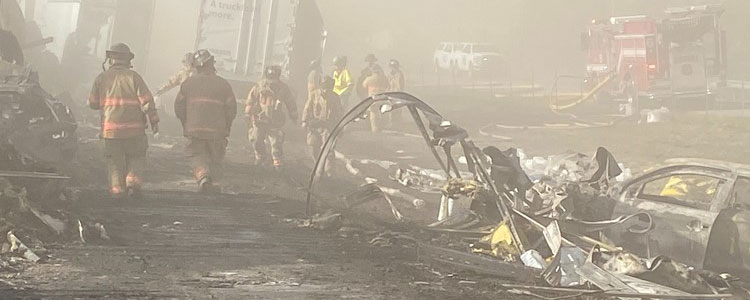
Important note for our readers: Prairie Rivers Network is grieving for the many people whose lives were cut short, who lost a loved one, and for those who were traumatized by the tragic accident on I-55 on Monday, May 2. Our hearts are with them and our commitment to addressing the causes of this preventable event only deepens. To that end, we believe it’s critically important that the public understands what caused this accident and the changes we need to make to ensure that this doesn’t happen again.
The dust storm that caused the May 1, 2023 horrible multiple-fatality accident was not merely the product of dry weather. Just like the Dust Bowl of the 1930s, this was a man-made ecological disaster caused by aggressive and exploitative farming systems. Tragically, yesterday’s events resulted in a tremendous loss of life and trauma for many people. Prairie Rivers Network expresses our condolences to all those who have been impacted.
The vast majority of fields in Illinois are left bare for half the year, with no roots in the ground, allowing the soil to blow away when the wind picks up or be washed away in a heavy rain. This is exacerbated by the concerted effort to remove all hedgerows, fence rows, and windbreaks in order to plant every last acre with corn and soybeans despite the clear environmental costs. And, in this case, the tragic loss of human life when a dust cloud enveloped I-55.
Even without an accident of this magnitude, these dust storms are disasters. Our landscape is stripped of precious topsoil, and people and wildlife are forced to breathe in not only the soil particulate, but also all the chemicals carried along with it—herbicides, insecticides, fungicides, fertilizers, et. al. You could not ask for a clearer example of how decisions made about how to farm do not end at the edge of the field, but quickly move downwind or downstream and impact us all.
We must move away from farming systems that pollute the air and water, add to greenhouse emissions, and strip soil—farming’s most valuable asset—right off the land. We know how to farm in ways that protect water, soil, air, and biodiversity. But we have lacked the political will to demand that the agricultural industry do better and adopt these systems. That has to change.







